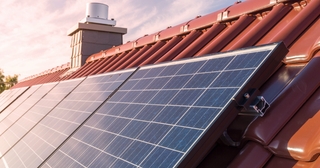How do solar panels work?
06 February 2020

Considering the sun’s energy travels nearly 93,000,000 miles to reach us, it seems like science-fiction that we can use it to boil our kettles. But it’s solar panels that turn this into science-reality.
Solar panels make for far more than fetching rooftop accessories. So, how do those black panels of mystery turn a sunny day into an energy-generating home?
How do solar panels generate electricity?
In short, solar panels work by capturing sunlight which is then turned into electricity.
Photovoltaic cells, photons and electrons may sound complicated, but soon you’ll be a solar expert. So let’s start with some basics.
You’ve seen a solar panel before, but have you seen one up-close? The surface of a standard residential solar panel is made up of around 60 photovoltaic cells (PVs for short), and these cells are held together by conductive materials.
Photons are particles of light that are emitted from the sun, which means you’ve got them to thank for your sunny days on the beach. PVs are the first point of contact for all inbound photons, but how does this make electricity?
Here’s where things get slightly more layered. PVs are made of two layers - a pair of semiconductors. One is positively charged, and the other is negatively charged. Placing both layers on top of one another causes tension among their electrons, creating an electric field. When photons (or light from the sun) are passed through this electric field, it causes the electrons to flow through the cell, creating a flow of electricity.
This electricity flow becomes a direct current (DC). The current is then sent to an inverter, where it is converted into an alternating current (AC). This conversion makes the electricity compatible with your home, and that’s how the panels use the power of the sun to create clean energy.
Now we’ve demystified the science behind the solar panel, let’s take a look at the benefits they offer.
What are the advantages of solar panels?
Unlimited power
The best part about sunlight is that if you run out, there’ll always be more tomorrow. Sunlight is the most readily available resource on the planet, which means that solar power has unlimited potential to create clean energy.
Unlike other forms of renewable energy, solar panels can be installed absolutely anywhere (though we wouldn’t recommend your basement). Whether it’s the rolling hills of the rural countryside, or the rooftops of an inner-city metropolis; if there’s sun, then there’s an opportunity to generate solar power.
Easily maintained
Solar panels don’t need around-the-clock care, only the occasional clean. The rest of the time they sit happily in the sun, producing clean energy. They also produce no harmful waste. No exhausts, fumes, or chemicals.
Saving energy with solar panels
Solar panels have numerous benefits, but can be costly to install. The price of purchasing and installing solar panels for the average household currently sits at around £4,000 - £6,000. Seems expensive? Luckily their cost continues to drop as the technology develops - at the start of the last decade they cost over £20,000.
Solar panels have huge potential to reduce your energy bills, but your savings depend on a number of factors.
How compatible your home is
To maximise the efficiency of solar panels, your home will ideally have a south-facing roof, and a roof pitch of between 30-40°. This is because throughout the day the sun moves from east to west. But don’t worry, even if you don’t have a roof tailor-made for solar panels, you’ll still be able to use them to generate electricity, just a little less effectively.
Tips on saving money using the home battery storage
It’s no surprise that the highest potential for energy savings coincides with the sunniest part of the day. The higher your proportion of energy usage is in the day, the more you could save throughout the year.
Many of us are not home during the day, and will miss the period in which the panels are generating the most energy. But, with home battery storage, the energy generated throughout the day can be stored for later use. That means once you’ve returned home from a long day of work, you can put your feet up and put the kettle on using the energy stored earlier that day.
Your energy savings are entirely dependent on your circumstances and usage. However, it’s estimated that an average household can make savings of between £90 - £240 per year*.
Get rewarded with the Smart Export Guarantee
Solar panels are great for preventing energy waste, and we think that should be rewarded. That’s why we offer the Smart Export Guarantee tariff. We’ll buy any spare energy generated from your solar panels and send it back into the grid. You get rewarded, and the grid gets cleaner. To learn more, visit our Smart Export Guarantee page.
Solar energy is just one of the many renewable technologies taking prominence as we take strides towards a happier, greener planet. There’s never been a better time to switch your energy and start doing your bit for our pale blue dot. If you’re interested in a renewable future, take a look at the rest of our blog, and our tariffs which offer 100% renewable electricity.
*Source: MoneySavingExpert, December 2019.